Benedicite!
She is lecturing to her husband how the neighbor's wife has things better and accuses him of trying to seduce the maid.
Benedicite!
She is lecturing to her husband how the neighbor's wife has things better and accuses him of trying to seduce the maid.
They all loved me so well, by God above, I never did set value on their love!
Three were good men and two were bad- yet she claims that they all loved her well in their own ways.
I bear no malice to virginity; Let such be bread of purest white wheat-seed, 150 And let us wives be called but barley bread;
She's not bashing the women who follow the rule of virginity, she's just saying it isn't for her.
That they were made for passing out, as known, Of urine, and our two belongings small Were just to tell a female from a male,
She is questioning the purpose of genitals. Is it really just to use the bathroom and to differ between two genders? Didn't god intend for more?
marriage.
I think this reflects the societal double standard of women, and how women can be held to a much higher standard than men. Overall I'm surprised by this story given the time it was written.
He has not every vessel all of gold; Some are of wood and serve well all their days.
Not everyone else has to be the gold standard, other people who are "less" are just of good of people.
Out of permission; there’s no shame should grieve In marrying me
All of her marriages ended in a way that was "proper", so she should be able to marry again without judgement.
virginity;
I think she is basically saying that virginity and the traditional religious beliefs at the time are not for her.
I understand he had more wives than one; And now would God it were permitted me
Kind of a double standard. Men/religious figures could marry however many times they want, but women are ridiculed for multiple marriages.
God bade us to increase and multiply;
It's God's wishes for humans to "multiply" so she is wondering why it is wrong then to marry multiple of times.
I never should have married more than once.
I wonder if she thinks this for religious reasons or because he first husband was who she truly loved.
And all were worthy men in their degree.
She declares that ll of the men she married were worthy men, yet she's married multiple times.
In Southwark, at this noble hostelry Known as the Tabard Inn
this is where all of the people had met
And thus, with flattery and equal japes, He made the parson and the rest his apes.
he tricked or fooled people with flattery
Devoutly
devotedly
buckler
a small round shield held by a handle or worn on the forearm.
Who had a fiery-red, cherubic face, All pimpled it was; his eyes were narrow As hot he was, and lecherous, as a sparrow; With black and scabby brows and scanty beard; 630 He had a face that little children feared.
understandably children were afraid of him
There was no agent, herd, or servant who’d cheat; He knew too well their cunning and deceit;
people didn't try to trick him because he could tell
Long were his legs, and they were very lean, And like a staff, with no calf to be seen. 595
he had long skinny string bean legs
Of masters had he more than three times ten,
does this mean he had more money than most masters?
But Christ’s own law, and His apostles’ twelve 530 He taught, but first he followed it himselve.
he literally practiced what he preached
That never wolf could make his plans miscarry;
i don't get what this is saying here
An overskirt was tucked around her buttocks large,
she had a big bum
Who was somewhat deaf, it is a pity.
was she deaf, deaf in one ear, or hard of hearing?
To speak of medicine and surgery; For he was instructed in astronomy. He cared for and saved a patient many times By natural science and studying astrological signs.
yay science! hopefully he used more science than astrological signs most of the time though....
And he could roast and boil and broil and fry, And prepare a stew, and bake a tasty pie.
these two lines just had a fun rhythm to me
Filled with moral virtue was his speech;
he had good morals, which makes a lot of sense if he studied philosophy
But all that he might borrow from a friend On books and learning he would swiftly spend,
this may be why he looks so thin, he spends all of his money on learning rather than food
Yet strong he was as every champion. 240 In towns he knew the taverns, every one, And every good host and each barmaid too – Better than needy lepers and beggars, these he knew.
he was super familiar with all of the taverns because of how he played
His throat was white as the lily flower I say
a simile!
Graciously she reached for food to dine. And certainly delighting in good sport, She was very pleasant, amiable – in short.
the description of her is how i would imagine a sweet nun to be
modest was and coy
she was shy, her smile was nice but not tempting at all
In company well could she laugh and chat
She is a happy person for sure.
perchance
perhaps
Married in church, husbands she had five
She has been married five times.
He kept the gold he gained from pestilence. 445 Since gold in physic is a cordial, Therefore he loved his gold exceeding all.
So he became a physician because he loves gold?
self-same
strange way of saying the same person
WIFE of BATH,
She is one of the few female pilgrims. She comes from the town of Bath, which is on the Avon River.
little birds make melody
i like the description of birds singing as making a melody
April the sweet showers fall
april showers bring may flowers!
Very often he took a draught of wine, Of Bordeaux vintage, while the trader slept.
He stole someone's wine?
dainty
something good to eat; a delicacy.
Wherefore
As a result of which
He knew how to recognize a draught of London ale.
He is a cook from London.
PRIORESS
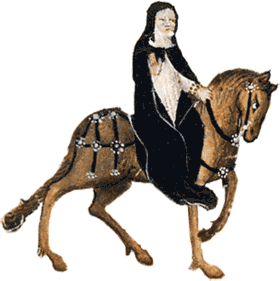
PARDONER
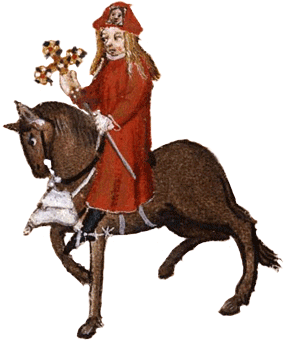
NUN
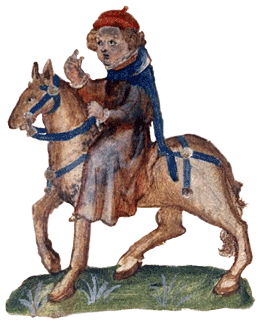
COUNTRY PARSON
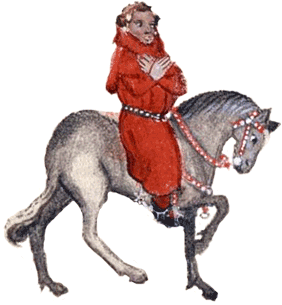
KNIGHT
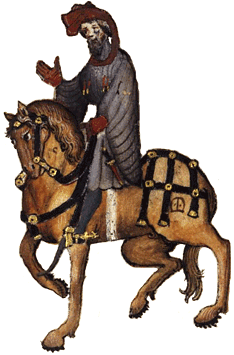
, or a near city,
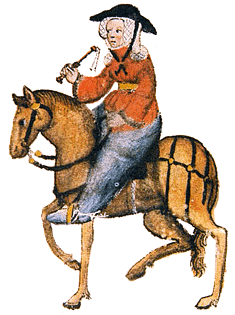
A SERGEANT OF THE LAW
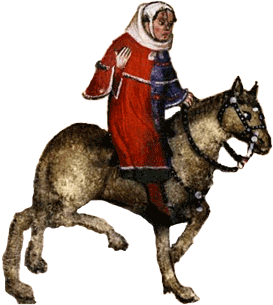
REEVE
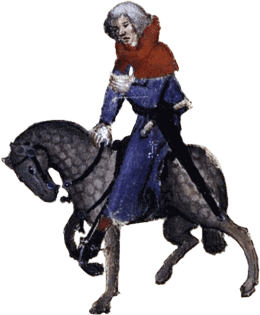
FRIAR
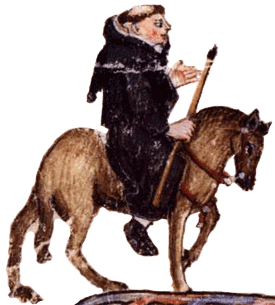
COOK
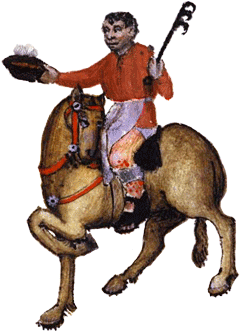
All of one solemn, great fraternity.
They support each other like a family.
Freshly and new their gear, and well adorned it was; Their weapons were not cheaply shaped with brass, But all with silver; neatly made and well 370 Their belt and their purses too, I tell.
These lines describe the tradesmen's physical appearance.
HABERDASHER
a hat and accessories dealer
According to the various seasons of the year 350 He changed lunch and changed his supper.
He knows how to enjoy life, and of course he's wealthy enough for him to do so!
Wherefore
for what reason
A SERGEANT OF THE LAW
A rich, powerful guy!
But all that he might borrow from a friend On books and learning he would swiftly spend, And then he’d pray diligently for the souls Of those who gave him resources to attend schools.
He prays for his friends who give him money to buy books.
But he looked emaciated, moreover, abstemiously.
He looks hollow.
CLERK
A poor, skinny student of philosophy.
General Prologue

He spoke out his opinions very solemnly
an opinionated guy
MERCHANT
This guy cares about his appearance a lot!
In motley gown, and high on horse he sat, Upon his head a Flemish beaver hat; 275 His boots were fastened neatly and elegantly.
He appears to be a successful businessman.
This worthy man kept all his wits well set; There was no person that knew he was in debt
He wears fancy clothes to hide the fact that he is in debt.
His revenue exceeded his costs, it is evident.
He is spending more than what he should have earned from begging!
And pins, to give to young and pleasing wives.
He buys gifts to women with the money he got from his position in the church.
It’s unsuitable, as far as he could see, 245 To have sick lepers for acquaintances. There is no honest advantageousness In dealing with such poor beggars;
He avoids the company of lepers and beggars.
He had arranged many a marriage, giving each Of young women, and this at his own cost.
He pays women to get them married off?
Equal his gossip and well-spoken speech. He had arranged many a marriage, giving each Of young women, and this at his own cost
He's a ladies' man.
Up rose our host, and acting as our cock, He gathered us together in a flock,
The characters are almost like animals.
That each of you, as if to shorten the day, Shall tell two stories as you wend your way
I think Chaucer is still speaking? He seems to be explaining how he will now tell two stories for each character.
Strong was the wine and pleasant to each guest. A seemly man our good host was, withal,
When I first thought of pilgrimages I thought it would be a long and hard journey and not like this.
To gain some silver, preferably from the crowd; Therefore he sang so merrily and so loud.
Not really the "correct" idea of Christianity.
his eyes were narrow As hot he was, and lecherous, as a sparrow;
Suggesting that he's quick tempered.
They were afraid of him as of the death.
This is a very powerful description.
REEVE
A president like figure of a town or village. https://en.wikipedia.org/wiki/Reeve_(England)
layman
A uneducated person.
But never did he fail, for rain or thunder, 495 In sickness, or in sin, or any state,
He's a very driven and determined person and seems to always put others first.
Bold was her face, and fair, and red of hue. She’d been respectable throughout her life, Married in church, husbands she had five,
I think Chaucer presents this is a way that is more candid than judgemental. He merely states her previous life.
Her stockings were of the finest scarlet red,
This reminds me so much of the Scarlet letter.
He knew the cause of every sickness,
Reminds me of The Sargent of the Law- he just seems TOO good at his profession.
Nice conscience was a thing he never kept. And if he fought and got the upper hand,
He doesn't seem to be a very good person...
He sadly rode a carthorse,
Is there a reason that he is so sad?
Were with us, clothed in the same livery,
They are all professionals that would likely interact, so it makes sense that they are dressed the same and almost seem to be the same person.
A pleasing live was the custom he’d won,
Interesting that he won the life, not earned it.
in his company;
Does "in his company" refer to the knight or to Chaucer?
And every law he knew entirely by rote.
He's memorized every law and rule- he doesn't even need to look things up for reference.
Nowhere a man so busy of his class, And yet he seemed much busier than he was.
He seems to enjoy money and valuables, but he also seems to work hard for what he has.
Not one word spoke he more than was necessary;
He seems either very shy or very smart ( no need to speak his opinion if that could later be used against him).
Of Aristotle and his philosophy
I wonder how much Aristotle influenced the clerk's tale.
But, to tell the truth, his name I can’t recall.
I was wondering if there was a reason that the merchant's introduction was so short ( he does later get a tale). I think the fact that Chaucer doesn't remember his name indicates that the merchant might be a sneak-by quiet kind of guy (he is in debt and might be use to avoiding the people he owes money to).
.
I definitely think this is the first time that Chaucer explores a very flawed character. The Knight's description depicted him as honest and brave. The Prioress's description depicted her a well manners and good-hearted. This just seems like Chaucer is bashing the friar. While the friar might be liked by some (the rich) he doesn't seem to care for women ( marrying a lot of them off) or the poor, so I'm not sure how much his charity efforts extends to.
rote.
A bowed string instrument.
Very many excellent horses had he in stable:
There's a lot of references of nature and animals with these characters.
Then pity ruled her
I can see this foreshadowing a problem for her.
forester
A person in charge of a forest, or planting. https://www.merriam-webster.com/dictionary/forester
And at one side a sword and a buckler, And at the other side a dagger bright,
It's interesting that the yeoman's introduction focuses on aspects like his weapons, where the knight and squire focused more on their characters (the squire was like May, the knight wasn't quick tempered etc.).
He was as fresh as is the month of May.
Earlier we had a mention of the month of April, now it mentions May- spring seems to be a common theme.
Though so strong and brave, he was very wise And of temper as meekly as a maid.
So he seems to be physically perfect, and mentally/ logically perfect.
and what a gentleman, Who, from the moment that he first began 45 To ride about the world, loved chivalry, Truth, honour, freedom and all courtesy.
We start off with a knight, who seems to be perfect and hold all of the true values of being a knight. I wonder if as we go on down the list of characters they become more flawed.
pilgrimage,
It's very fitting that the story starts off in spring ( a time of renewal) and then transitions to talk about pilgrimages (which can be seen as spiritual/ religious renewal).
.
Ok the monk is nothing like the usual monk many people imagine. He is rebellious, doesn't follow rules, rather goes hunting instead of praying. He seems to be a regular person than a monk. The narrator likes him and seems to agree with his way of life.
cloister
A cloister is a covered area round a square in a monastery or a cathedral.
MONK
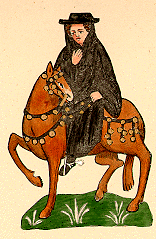
one of the finest sort
a handsome guy?
Then pity ruled her, and her tender heart. Very seemly her pleated wimple was; Her nose was fine; her eyes were grey as glass; Her mouth was small and therewith soft and red; But certainly her forehead was fairly spread; 155 It was almost a full span broad, I own, To tell the truth, she was not undergrown. Her cloak, as I was well aware, had a graceful charm
All of the characteristics the narrator describes here are pointing to the fact that Prioress is a noble woman.
A forester he truly was, I guess.
The narrator doesn't give too much details to the military servant's character.
a sun-browned face.
He's outside a lot.
he was clothed in coat and hood of green
Robin Hood?
Courteous he, and humble, willing and able
Direct characterization
He could make songs and words thereto indite, Joust, and dance too, as well as sketch and write.
And he knows how to sing, dance, draw, and write (probably poetry).
Short was his gown, with sleeves both long and wide.
He knows how to dress :)
He never yet had any vileness said,
He never spoke anything rude to anyone.
Algeciras
in Spain
Tramissene
Tramissene, or Tlemcen, is the site of Christian crusades in Algeria.
To ride about the world, loved chivalry, Truth, honour, freedom and all courtesy.
This is one perfect guy!
So had I spoken with them, every one, That I was of their fellowship anon, And made agreement that we’d early rise To take the road, as I will to you apprise.
Sounds like he's writing some time after the events of his story.
In fellowship, and pilgrims were they all That toward Canterbury town would ride.
Sounds like the group was formed by chance.
Canterbury
a historic English cathedral city and UNESCO World Heritage Site
So Nature pricks them on to ramp and rage
So nature pricks them and their heart engages
pilgrimage
a journey undertaken for a religious motive
Then folk do long to go on pilgrimage,
Oh I thought the opening suggests a romantic story. Guess I was wrong!
When in April the sweet showers fall That pierce March’s drought to the root and all And bathed every vein in liquor that has power To generate therein and sire the flower; 5 When Zephyr also has with his sweet breath, Filled again, in every holt and heath,
The first few lines celebrate the vitality and richness of spring. How beautiful!
young sun
spring sun
bygynneth
begins
Canterbury Tales
General Prologue
morsels
a bite, mouthful; small piece
Significavit
order for imprisonment (the first word of a writ in which the imprisonment of an excommunicated person is ordered)
When all treasures be tried · Truth is the best.
literary device: repetition<br> Langland is trying to get across that telling the truth is the best treasure than to chose lying and that he needs to have faith and love god. Pressing truth and looking to God for guidance
But those that work well · as holy writ telleth, And end, as I have said · in truth, that is best, May be sure that their soul · shall wend to Heaven,
unlike the liars who go to hell, those who tell the truth shall ascend to Heaven
lieth of them all.
so the worst liar of them all ?
But because he obeyed not
he was renounced and fell into a hell where other like him who disobeyed followed him soon after where they would stay there forever
archangels,
here is a clip of more information about the 7 archangels https://www.youtube.com/watch?v=c_-f1LRF18Y
apostate was from the order.
knights were worn to their swords to stay truthful and if they failed to do so, they were renounced from their religion
And never leave them for love · nor for seizing of silver.
Knights are to stay truthful no matter what, not for money nor love should they tell a lie
.
He talks to Holy Church who tells him to have faith in God and assures him to always tell the truth
That thou shouldest be ware · I teach thee the best.
it's best to steer clear of drinking
Putting blame on the wine · for that wicked deed:
"blaming wine" for the devilish act of infidelity
throng
a large, densely packed crowd of people
Hot pies, hot! Good geese and pork! Let’s go and dine!’
so since he is dreaming is Langland comparing this to the famine that is taking place in reality.
dawdle away the long day
waste time
louts
aggressive man or boy with an excessive sexual desire
He cozened them with his brevet
Being of honorary rank and using it to deceive the laymen
.
wow that's godly of them to be abusing their power and using it for their own selfish needs
their tongue turned to lies More than to tell truth · it seemed by their speech.
so they travel and make up stories? I wonder why... more attention or to spice up the story?
Feigning their fancies · and making folk fools
jesters and janglers telling jokes and stories
Such as anchorites and hermits · that kept them in their cells
comparing the religious practices of the laypeople to hermits in which they are "kept in their cells"
.
In his first dream he is found in the wilderness where to the east he sees a tower and beneath a scary looking dungeon. He also sees a field of hardworking men rich and poor working and plowing the land where they have no time for play.
fair field full of folk · found
alliteration
deep ditches and dark · and dreadful
alliteration
Under a broad bank · by a brook’s side
a body of water
I was weary with wandering · and went me to rest
he fell asleep
And grant that summoners good men become!
This is a bold statement considering the story is being told in front of another summoner.
And you shall come to hell with me tonight,
With the old woman's wish the summoner is taken to hell by the devil.
The Devil,” said she, “take him alive today, 365 And pan and all, unless he will repent!”
"take him alive" = the old woman is wishing for the summoner to be taken by the devil.
I have been sick, and that for many a day.
He is going to blackmail a sick older woman- he really had no conscience.
crone
A cruel or ugly old woman. https://www.merriam-webster.com/dictionary/crone
yet God knows I know of her no vice.
He is trying to blackmail a elder woman, even though she hasn't even done anything wrong/ criminal.
The peasant said one thing, but thought another. 305 Let us go forth upon our travellers’ way;
Could the moral of the story be to watch what you say or truly mean what you say?
“God knows, never a bit. It is not his intention, trust to it.
When the man cried for the devil to take his cart he wasn't sincere and the devil knew this and he knew because of this he couldn't take the cart. The summoner cannot take things without blackmailing people- so both of them have limitations on things they cannot take.
And if that either of us gets more than other, 270 Let him be true and share it with his brother.
I wonder if this will hold true or if they will break their promise given their nature.
My loyalty will I preserve to my dear brother, As I have sworn, and each of us to other, 265 That we will be true brothers in this case;
They remain sworn brothers, even after they reveal their true identities to one another and they both acknowledge their evil nature.
bailiff,
A person in the court who keeps order. https://en.wikipedia.org/wiki/Bailiff
And sometimes we are servants unto man, As to that old archbishop, Saint Dunstan, And to the apostles servant once was I.”
A very corrupt church at the time.
And sometimes have we power of both, you know, That is to say, of soul and body too.
Similar to the knight's tale- a higher power out of human control rules.
No kind of conscience for such things have I.
The summoner almost proudly admits he has no conscience when it comes to his theft practice- like he's done it a lot and got used to it.
extortion
The yeoman obtains things by force of threat ( very fitting with the summoner's behavior).
My lord is harsh to me and niggardly, My job is most laborious, you see;
This suggests to me that the yeoman is a servant to someone else who holds land.
140 And they struck hands and made their solemn oath
The yeoman ( a person who holds land or a servant) asks for the summoners kindness and guidance, and they both strike a friendship.
He dared not, no, for very filth and shame, 130 Say that he was a summoner, for the name.
This connects a lot to how the summoner in the prologue in Chaucer's pilgrimage acts. Summoners seem to carry a bad name.
He wore a short coat of the Lincoln green
The color green reoccurs a lot in these tales.
And was a thief, just such a thief was he. His master got but half of every fee.
The summoner is a thief, who takes money from the sinners that he learns of, but he takes too much money and keeps it for himself (he seems very greedy).
He could protect of lechers one or two To learn of four and twenty more, mark you.
He helped people who had sinned because they would tell him who else has sinned.
summoner
A summoner= a person who calls and brings people accused of spiritual crimes to the court. This one seems somewhat evil and manipulative.
And payers of short tithes to shame descended.
Tithes= A payment of 1/10th of their earning that is paid to the church. https://en.wikipedia.org/wiki/Tithe A archdeacon makes people pay some of their earnings with the promise that they will be forgiven for their sins.
That of a summoner may no good be said; I pray that no one will be angry made.
The summoner is not necessary a good person, and maybe a manipulative/ conning.
Geoffrey Chaucer
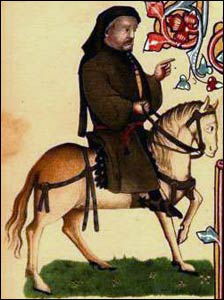
The Knight’s Tale

By which he saw the vgly monster plaine, Halfe like a serpent horribly displaide, But th’other halfe did womans shape retaine, Most lothsom, filthie, foule, and full of vile disdaine.
the monster was half serpent (snake) half women, and she was filthy and foul so she smelled really bad
But forth vnto the darksome hole he went, And looked in: his glistring armor made A litle glooming light, much like a shade,
the knight still went into the cave after the monster
Behind her farre away a Dwarfe did lag,
Una had a dwarf with her
That greatest Gloriana to him gaue, That greatest Glorious Queene of Faerie lond,
this is the Faerie Queene and i believe she is a representation for Queen Elizabeth
nd all the way she wets with flowing teares:
this is a much cooler way to says she is crying
All night she thinks too long, and often lookes for light.
shes looking for light in the dark. the light is perhaps a representation for something else
Sad Vna downe her laies in wearie plight, And at her feet the Lyon watch doth keepe: In stead of rest, she does lament, and weepe For the late losse of her deare loued knight, And sighes, and grones, and euermore does steepe Her tender brest in bitter teares all night, All night she thinks too long, and often lookes for light.
Una is very sad because she misses redcross, so she has trouble sleeping
To whom approching she to her gan call, To weet, if dwelling place were nigh at hand; But the rude wench her answer’d nought at all, She could not heare, nor speake, nor vnderstand; Till seeing by her side the Lyon stand,
the others were kind until they saw the lion
A ramping Lyon rushed suddainly, Hunting full greedie after saluage blood; Soone as the royall virgin he did spy, With gaping mouth at her ran greedily,
a scary lion appears and sees her
In stead thereof he kist her wearie feet, And lickt her lilly hands with fawning tong, As he her wronged innocence did weet. O how can beautie maister the most strong, And simple truth subdue auenging wrong? Whose yeelded pride and proud submission, Still dreading death, when she had marked long, Her hart gan melt in great compassion, And drizling teares did shed for pure affection.
he was actually very sweet and kind
Was neuer Prince so faithfull and so faire, Was neuer Prince so meeke and debonaire; But ere my hoped day of spousall shone, My dearest Lord fell from high honours staire, Into the hands of his accursed fone, And cruelly was slaine, that shall I euer mone.
i think the had admired and loved him, seeing him maybe as a future husband but is now second guessing it
subiect to hard mischaunce,
subject to hard mischance... she thinks she is just unlucky
louer
i think this is lover?
Did search, sore grieued in her gentle brest, He so vngently left her, whom she loued best.
the redcrosse left her
Swain
sometimes a young lover
vp
similarly 'v' is used as a 'u'
espide
caught a glimpse of